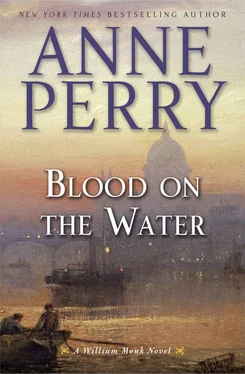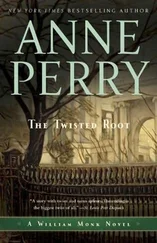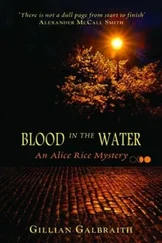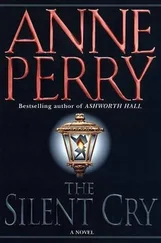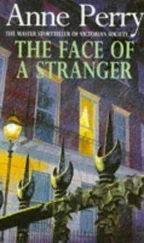Anne Perry - Blood on the Water
Здесь есть возможность читать онлайн «Anne Perry - Blood on the Water» весь текст электронной книги совершенно бесплатно (целиком полную версию без сокращений). В некоторых случаях можно слушать аудио, скачать через торрент в формате fb2 и присутствует краткое содержание. Год выпуска: 2014, ISBN: 2014, Издательство: Random House Publishing Group, Жанр: Исторический детектив, на английском языке. Описание произведения, (предисловие) а так же отзывы посетителей доступны на портале библиотеки ЛибКат.
- Название:Blood on the Water
- Автор:
- Издательство:Random House Publishing Group
- Жанр:
- Год:2014
- ISBN:978-0-345-54844-3
- Рейтинг книги:3 / 5. Голосов: 1
-
Избранное:Добавить в избранное
- Отзывы:
-
Ваша оценка:
- 60
- 1
- 2
- 3
- 4
- 5
Blood on the Water: краткое содержание, описание и аннотация
Предлагаем к чтению аннотацию, описание, краткое содержание или предисловие (зависит от того, что написал сам автор книги «Blood on the Water»). Если вы не нашли необходимую информацию о книге — напишите в комментариях, мы постараемся отыскать её.
Blood on the Water — читать онлайн бесплатно полную книгу (весь текст) целиком
Ниже представлен текст книги, разбитый по страницам. Система сохранения места последней прочитанной страницы, позволяет с удобством читать онлайн бесплатно книгу «Blood on the Water», без необходимости каждый раз заново искать на чём Вы остановились. Поставьте закладку, и сможете в любой момент перейти на страницу, на которой закончили чтение.
Интервал:
Закладка:
Hester did not interrupt him. There was nothing useful to say about such a horror as he went on to describe in halting sentences, short, simple words broken as he struggled for breath. She thought of the terror, the darkness, women desperate to protect their children, the old and the frightened stumbling over one another, the screaming, the smell of blood.
“They counted over two hundred bodies,” he said softly, his voice cracking a little. “Including babes in arms.”
“For the two hundred on the Princess Mary ,” she answered. “Equally innocent. Did Sabri come from that village? Or was he paid to do it, do you think?” She tried to hold in the grief that all but suffocated her. “Why did no one say anything? What sort of revenge is it if the guilty don’t know?” She gave a tiny shrug. “My husband had an idea that perhaps it was to kill one person on the ship. The rest were just … part of the plan. Expendable. If you are right, then he was mistaken. Perhaps this isn’t as terrible, as frighteningly insane.” Then she asked the question she had to, no matter how much it hurt. “Were they British mercenaries?”
“Not specifically,” the major replied, his voice grating with the effort of controlling it. “A bit of all sorts. But the commander was British. That’s what counts.”
“Who?”
“A man named Wilbraham. I don’t know much more about him. Don’t look at me like that, Mrs. Monk. I really don’t.”
“How do you know any of it?”
“From a man who was there and tried to stop it.”
“Obviously he failed …”
“He was badly injured trying to prevent it, and was left for dead by the man in command.” His voice dropped a little lower, but his eyes never left hers. “He was rescued by the great courage of one of his own men, an Egyptian who saw it all.”
“But he didn’t testify to any of it?” She would rather not have said it, but it hung in the air between them like a tangible thing.
“I don’t know why,” Kittering admitted. “But I imagine it was to protect his family. If he had done, vengeance on them would have been swift, and complete. Would you?”
She thought of Monk, then of Scuff. “No.” She took the paper out of her pocket that had the six names on it and passed it over to him. “Is he one of these?”
“Yes,” he said quietly. “Who are they?”
“Among the dead,” she replied.
“Then your husband was right,” Kittering said quietly. “The Princess Mary was sunk to be sure of silencing one man.”
CHAPTER 20
After the court was adjourned, Rathbone spread out on his dining room table all the documents he had regarding the trial of Habib Beshara. It was the best way he could think of to help Brancaster. They were drawing near to the final stage of the battle, and it was far more evenly balanced than he wished. There was a difficult judgment call to make. If they allowed the jury to be complacent, to believe that all was well with the justice system, then they would lose. It was always harder to defy or overturn a verdict than it was to reach one in the first place.
And yet if they used fear, either of the atrocity happening again because the guilty man had gone free, or of an innocent man being convicted and hanged in the future, they might panic the jury, and all its vision and balance would be lost.
That was the trouble: The whole case rested on emotion. Therefore none of the usual rules could be relied on.
Rathbone started reading the transcript of the trial of Habib Beshara, presided over by York. He smiled to himself. Here he was searching for emotional bias in York’s rulings, and he was so emotionally involved himself that he was overcompensating in every direction in order to try to be fair. He should not be the one doing this, but it was his skill, his experience, that was needed.
He understood the law and most of the idiosyncrasies, particularly those that opened either traps or opportunities for men who made their money and their fame in its practice.
Brancaster had to use this all-too-short weekend in order to think of a strategy to keep Pryor from simply closing the case and relying on the jury to return a decision that Sabri was not guilty beyond a reasonable doubt.
Rathbone had been reading for nearly two hours, unaware of the evening drawing in, when he found the first serious error. York had upheld Camborne’s objection when the grounds were insufficient. Over and over again Camborne had interrupted unnecessarily, played on the emotions of grief, even suggested that failure to convict Beshara was a blasphemy against the memory of the dead. Twice Juniver had argued vehemently and been overruled for questioning York’s decision. He had wisely refrained from trying a third time, but Rathbone could imagine his frustration. Had it been Rathbone in his place, he would have taken it as a warning that he had a deeply unfriendly judge, maybe even a prejudiced one.
Of course, it was always possible that the horror of the case had affected York. The authorities would have made certain that he had no immediate family bereaved by the atrocity, but many people would’ve had friends or neighbors or associates who had lost someone, or knew someone who had lost someone.
Rathbone requested a pot of tea, and read on. Camborne was good: In fact, he was excellent. Not only that, but of course the crowd had been with him, and he had taken advantage of it. The rulings had leaned more and more his way.
Would Rathbone have done that, in his place? If he were honest, he was obliged to admit that he probably would.
Dover brought the tea and Rathbone accepted it gratefully. He had not realized he was so thirsty.
He went back to the transcript and studied it further. Very few of York’s decisions were in favor of the defense. Had Juniver been so often wrong? Had he been so desperate that he’d been grasping at straws that would not bear the weight of his argument?
Or was Camborne simply the better lawyer? The fact that he was actually wrong could not have been known then.
Rathbone reached the end and went back to the beginning again. By that time it was midnight-the clock on the mantelshelf struck the hour. He ignored it. He made notes of every single one of York’s decisions, and slowly a pattern emerged. York had favored the prosecution, and then favored them again to avoid reversing the earlier decision, compounding the error.
Singly, each decision was just about acceptable. Only when viewed cumulatively, and apart from the emotion of the case, did they amount to prejudice.
He finally put the papers away and went to bed at just after two in the morning. He was determined to go to visit Alan Juniver the following morning, regardless of the fact that it was Saturday. They had no time to spare.
Juniver was startled to see him. He was sitting in his home glancing at the morning newspapers before preparing to go out for the day with his fiancée’s family.
“I’m sorry,” Rathbone said. “I wouldn’t call now if any other time would do. In fact I am concerned that I may already be too late.”
Juniver looked worried. “It will not be viewed well if I don’t turn up on time,” he said anxiously. “Mr. Barrymore is already of the opinion that I am not the best choice his daughter could make.”
Rathbone smiled ruefully. “I am not in a position to argue that particular case,” he admitted. “If she wishes you at her beck and call for social occasions she might do better with a banker, or a stockbroker in the City. Of course she might then be bored to death, but one has to pick and choose which virtues or advantages one counts most important.” The moment he had said it he could have bitten the words back, but it was too late. Apologizing might only make it worse.
Читать дальшеИнтервал:
Закладка:
Похожие книги на «Blood on the Water»
Представляем Вашему вниманию похожие книги на «Blood on the Water» списком для выбора. Мы отобрали схожую по названию и смыслу литературу в надежде предоставить читателям больше вариантов отыскать новые, интересные, ещё непрочитанные произведения.
Обсуждение, отзывы о книге «Blood on the Water» и просто собственные мнения читателей. Оставьте ваши комментарии, напишите, что Вы думаете о произведении, его смысле или главных героях. Укажите что конкретно понравилось, а что нет, и почему Вы так считаете.
